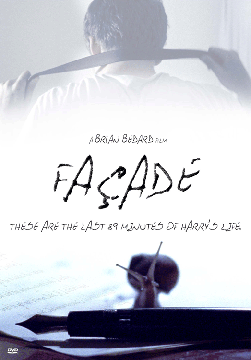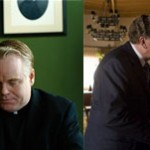Review: FACADE
Façade (2004)–****
 Façade is a startling and profound film that could have been considered one of those wake-up call movies were it handled differently. Brian Bedard’s first feature avoids that designation to its benefit, so we aren’t distracted from the tragic and personal story that unfolds.
Façade is a startling and profound film that could have been considered one of those wake-up call movies were it handled differently. Brian Bedard’s first feature avoids that designation to its benefit, so we aren’t distracted from the tragic and personal story that unfolds.
The real-time film ominously begins with the words “This film will end in 89 minutes” fading in and then out on a black screen. It may not be as direct as William Holden face down in a swimming pool, but it’s enough to make you realize that Façade is headed toward a heartbreaking end.
We meet Harold (Patrick J. Adams), a meek and distressed 19-year-old who spends part of his birthday writing a letter to his dad who is no longer in the picture for unknown reasons. Harold’s mom (Marilyn McIntyre) and her live-in boyfriend Ronnie (Joseph Hacker) are heading to Hawaii, leaving Harold without parental supervision on his birthday.
Harold is not alone, though. His best friend Johnny (Brian Bedard) joins him before the adults leave. Johnny is a charming, bad boy who has an apparent ability to woe even Harold’s mom and Ronnie. When Johnny shows up, Ronnie passes him some cash and tells the kid to show Harold a good time for his birthday.
Of course, it’s not that simple. Harold soon finds out that Ronnie is going propose to Harold’s mom. Then a drug dealer named Tits (Scott Cushman) shows up to make the party burn a little brighter. When Harold’s domineering girlfriend Shannon (Shannon Coltrane), who has a history with Johnny, starts to fight with his best friend, the birthday celebration proves to be the final countdown on emotional time bomb that was set to explode for a long time.
At the end of the film’s 89 minutes, Harold commits suicide. That is not a spoiler for anyone with even an average ability to read a film (or the cover of the DVD, for that matter). No, it is not a spoiler, just the sad truth from the end of this emotional and alarming film.
I say alarming knowing it could be misinterpreted. Like I said before, this film isn’t an After School Special, where we learn that suicide is a bad idea. Bedard doesn’t end the film with an emotionally dishonest and intellectually diluted screen of teenage suicide statistics. Façade is too big to turn it into something that simple. It’s not that suicide isn’t a bad idea, but in Façade, it is more important to focus on the tragedy.
Adam’s plays Harold with the idea of tragedy in mind. His psychological instability is occasionally divulged through the hitting of his own face and hair pulling, but Adam’s performance is more interesting when he is being pulled in two-directions, stuck in between a girlfriend and a best friend. It gives him a chance to show how pent-up and on the verge Harold really is.
Bedard deserves credit here as well. While he pulls an Orson Welles in this film (acting, directing and writing), Bedard stays on the more interesting side of the line between over-sentimental melodrama and sincere dramatic filmmaking. By directing Adams and the other with the theatrical flair of Elia Kazan, Bedard’s personal story becomes the audience’s as well.
Façade isn’t all drama, but even the lighter comedic moments serve a dramatic purpose. The drug dealer has a certain charm, and is portrayed as a shaman-like character that pushes the other characters toward an inevitable end. With his brief romancing of Shannon’s friend nicely offsetting Harold and Shannon’s destructive relationship, Tits’ importance cannot be understated.
Façade is a miracle. Like watching the first film of Spike Lee, Martin Scorsese or, more recently, David Gordon Greene, Bedard’s Façade exudes intelligence, expertise and a sense of great things to come. In a perfect world, Façade would already have distribution and be on the big screen in at least the top 10 markets. Maybe next time, though. With a film like Façade, there just has to be a next time.










